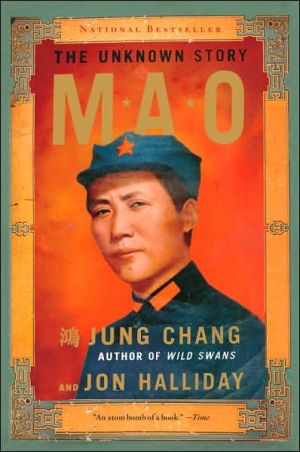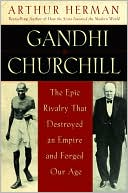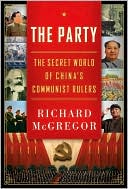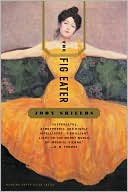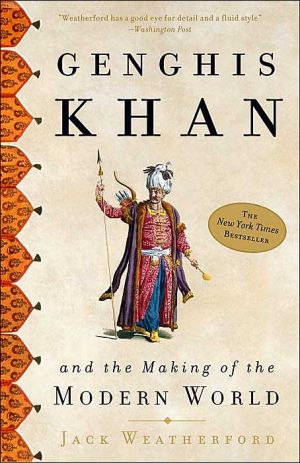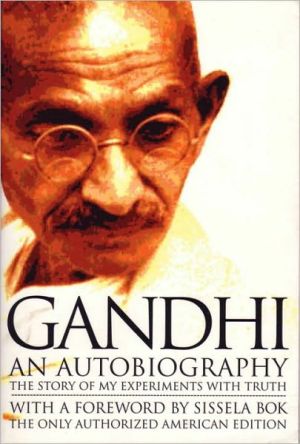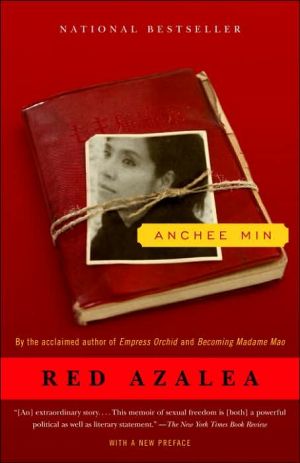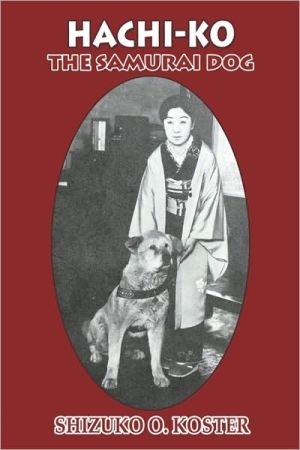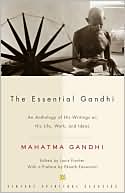Mao: The Unknown Story
Based on a decade of research and on interviews with many of Mao’s close circle in China who have never talked before--and with virtually everyone outside China who had significant dealings with him--this is the most authoritative life of Mao ever written. It is full of startling revelations, exploding the myth of the Long March, and showing a completely unknown Mao: he was not driven by idealism or ideology; his intimate and intricate relationship with Stalin went back to the 1920s,...
Search in google:
Ever since the spectacular success of Chang s Wild Swans we have waited impatiently for her to complete with her husband this monumental study of China s most notorious modern leader. The expectation has been that she would rewrite modern Chinese history. The wait has been worthwhile and the expectation justified. This is a bombshell of a book. Chris Patten, the last governor of Hong Kong, in The Times (London)Based on a decade of research and on interviews with many of Mao s close circle in China who have never talked before and with virtually everyone outside China who had significant dealings with him this is the most authoritative life of Mao ever written. It is full of startling revelations, exploding the myth of the Long March, and showing a completely unknown Mao: he was not driven by idealism or ideology; his intimate and intricate relationship with Stalin went back to the 1920s, ultimately bringing him to power; he welcomed Japanese occupation of much of China; and h... The New York Times Sunday Book Review - Nicholas D. Kristof … this is a magisterial work. True, much of Mao's brutality has already emerged over the years, but this biography supplies substantial new information and presents it all in a stylish way that will put it on bedside tables around the world. No wonder the Chinese government has banned not only this book but issues of magazines with reviews of it, for Mao emerges from these pages as another Hitler or Stalin.
On the Cusp from Ancient to Modern\ (1893–1911 H age 1–17)\ Mao tse-tung, who for decades held absolute power over the lives of one-quarter of the world’s population, was responsible for well over 70 million deaths in peacetime, more than any other twentieth-century leader. He was born into a peasant family in a valley called Shaoshan, in the province of Hunan, in the heartland of China. The date was 26 December 1893. His ancestors had lived in the valley for five hundred years.\ This was a world of ancient beauty, a temperate, humid region whose misty, undulating hills had been populated ever since the Neolithic age. Buddhist temples dating from the Tang dynasty (ad 618–906), when Buddhism first came here, were still in use. Forests where nearly 300 species of trees grew, including maples, camphor, metasequoia and the rare ginkgo, covered the area and sheltered the tigers, leopards and boar that still roamed the hills. (The last tiger was killed in 1957.) These hills, with neither roads nor navigable rivers, detached the village from the world at large. Even as late as the early twentieth century an event as momentous as the death of the emperor in 1908 did not percolate this far, and Mao found out only two years afterwards when he left Shaoshan.\ The valley of Shaoshan measures about 5 by 3.5 km. The 600-odd families who lived there grew rice, tea and bamboo, harnessing buffalo to plough the rice paddies. Daily life revolved round these age-old activities. Mao’s father, Yi-chang, was born in 1870. At the age of ten he was engaged to a girl of thirteen from a village about 10 kilometres away, beyond a pass called Tiger Resting Pass, where tigers used to sun themselves. This short distance was long enough in those years for the two villages to speak dialects that were almost mutually unintelligible. Being merely a girl, Mao’s mother did not receive a name; as the seventh girl born in the Wen clan, she was just Seventh Sister Wen. In accordance with centuries of custom, her feet had been crushed and bound to produce the so-called three-inch golden lilies that epitomised beauty at the time.\ Her engagement to Mao’s father followed time-honoured customs. It was arranged by their parents and was based on a practical consideration: the tomb of one of her grandfathers was in Shaoshan, and it had to be tended regularly with elaborate rituals, so having a relative there would prove useful. Seventh Sister Wen moved in with the Maos upon betrothal, and was married at the age of eighteen, in 1885, when Yi-chang was fifteen.\ Shortly after the wedding, Yi-chang went off to be a soldier to earn money to pay off family debts, which he was able to do after several years. Chinese peasants were not serfs but free farmers, and joining the army for purely financial reasons was an established practice. Luckily he was not involved in any wars; instead he caught a glimpse of the world and picked up some business ideas. Unlike most of the villagers, Yi-chang could read and write, well enough to keep accounts. After his return, he raised pigs, and processed grain into top-quality rice to sell at a nearby market town. He bought back the land his father had pawned, then bought more land, and became one of the richest men in the village.\ Though relatively well off, Yi-chang remained extremely hard- working and thrifty all his life. The family house consisted of half a dozen rooms, which occupied one wing of a large thatched property. Eventually Yi-chang replaced the thatch with tiles, a major improvement, but left the mud floor and mud walls. The windows had no glass—still a rare luxury—and were just square openings with wooden bars, blocked off at night by wooden boards (the temperature hardly ever fell below freezing). The furniture was simple: wooden beds, bare wooden tables and benches. It was in one of these rather spartan rooms, under a pale blue homespun cotton quilt, inside a blue mosquito net, that Mao was born.\ Mao was the third son, but the first to survive beyond infancy. His Buddhist mother became even more devout to encourage Buddha to protect him. Mao was given the two-part name Tse-tung. Tse, which means “to shine on,” was the name given to all his generation, as preordained when the clan chronicle was first written in the eighteenth century; tung means “the East.” So his full given name meant “to shine on the East.” When two more boys were born, in 1896 and 1905, they were given the names Tse-min (min means “the people”) and Tse-t’an (tan possibly referred to the local region, Xiangtan).\ These names reflected the inveterate aspiration of Chinese peasants for their sons to do well—and the expectation that they could. High positions were open to all through education, which for centuries meant studying Confucian classics. Excellence would enable young men of any background to pass imperial examinations and become mandarins—all the way up to becoming prime minister. Officialdom was the definition of achievement, and the names given to Mao and his brothers expressed the hopes placed on them.\ But a grand name was also onerous and potentially tempted fate, so most children were given a pet name that was either lowly or tough, or both. Mao’s was “the Boy of Stone”—Shisan yazi. For this second “baptism” his mother took him to a rock about eight feet high, which was reputed to be enchanted, as there was a spring underneath. After Mao performed obeisance and kowtows, he was considered adopted by the rock. Mao was very fond of this name, and continued to use it as an adult. In 1959, when he returned to Shaoshan and met the villagers for the first—and only—time as supreme leader of China, he began the dinner for them with a quip: “So everyone is here, except my Stone Mother. Shall we wait for her?”\ Mao loved his real mother, with an intensity he showed towards no one else. She was a gentle and tolerant person, who, as he remembered, never raised her voice to him. From her came his full face, sensual lips, and a calm self-possession in the eyes. Mao would talk about his mother with emotion all his life. It was in her footsteps that he became a Buddhist as a child. Years later he told his staff: “I worshipped my mother . . . Wherever my mother went, I would follow . . . going to temple fairs, burning incense and paper money, doing obeisance to Buddha . . . Because my mother believed in Buddha, so did I.” But he gave up Buddhism in his mid-teens.\ Mao had a carefree childhood. Until he was eight he lived with his mother’s family, the Wens, in their village, as his mother preferred to live with her own family. There his maternal grandmother doted on him. His two uncles and their wives treated him like their own son, and one of them became his Adopted Father, the Chinese equivalent to godfather. Mao did a little light farm work, gathering fodder for pigs and taking the buffaloes out for a stroll in the tea-oil camellia groves by a pond shaded by banana leaves. In later years he would reminisce with fondness about this idyllic time. He started learning to read, while his aunts spun and sewed under an oil lamp.\ Mao only came back to live in Shaoshan in spring 1902, at the age of eight, to receive an education, which took the form of study in a tutor’s home. Confucian classics, which made up most of the curriculum, were beyond the understanding of children and had to be learnt by heart. Mao was blessed with an exceptional memory, and did well. His fellow pupils remembered a diligent boy who managed not only to recite but also to write by rote these difficult texts. He also gained a foundation in Chinese language and history, and began to learn to write good prose, calligraphy and poetry, as writing poems was an essential part of Confucian education. Reading became a passion. Peasants generally turned in at sunset, to save on oil for lamps, but Mao would read deep into the night, with an oil lamp standing on a bench outside his mosquito net. Years later, when he was supreme ruler of China, half of his huge bed would be piled a foot high with Chinese classics, and he littered his speeches and writings with historical references. But his poems lost flair.\ Mao clashed frequently with his tutors. He ran away from his first school at the age of ten, claiming that the teacher was a martinet. He was expelled from, or was “asked to leave,” at least three schools for being headstrong and disobedient. His mother indulged him but his father was not pleased, and Mao’s hopping from tutor to tutor was just one source of tension between father and son. Yi-chang paid for Mao’s education, hoping that his son could at least help keep the family accounts, but Mao disliked the task. All his life, he was vague about figures, and hopeless at economics. Nor did he take kindly to hard physical labour. He shunned it as soon as his peasant days were over.\ Yi-chang could not stand Mao being idle. Having spent every minute of his waking hours working, he expected his son to do the same, and would strike him when he did not comply. Mao hated his father. In 1968, when he was taking revenge on his political foes on a vast scale, he told their tormentors that he would have liked his father to be treated just as brutally: “My father was bad. If he were alive today, he should be ‘jet-planed.’ ” This was an agonising position where the subject’s arms were wrenched behind his back and his head forced down.\ Mao was not a mere victim of his father. He fought back, and was often the victor. He would tell his father that the father, being older, should do more manual labour than he, the younger—which was an unthinkably insolent argument by Chinese standards. One day, according to Mao, father and son had a row in front of guests. “My father scolded me before them, calling me lazy and useless. This infuriated me. I called him names and left the house . . . My father . . . pursued me, cursing as well as commanding me to come back. I reached the edge of a pond and threatened to jump in if he came any nearer . . . My father backed down.” Once, as Mao was retelling the story, he laughed and added an observation: “Old men like him didn’t want to lose their sons. This is their weakness. I attacked at their weak point, and I won!”\ Money was the only weapon Mao’s father possessed. After Mao was expelled by tutor no. 4, in 1907, his father stopped paying his son’s tuition fees and the thirteen-year-old boy had to become a full-time peasant. But he soon found a way to get himself out of farm work and back into the world of books. Yi-chang was keen for his son to get married, so that he would be tied down and behave responsibly. His niece was at just the right age for a wife, four years older than Mao, who agreed to his father’s plan and resumed schooling after the marriage.\ The marriage took place in 1908, when Mao was fourteen and his bride eighteen. Her family name was Luo. She herself had no proper name, and was just called “Woman Luo.” The only time Mao is known to have mentioned her was to the American journalist Edgar Snow in 1936, when Mao was strikingly dismissive, exaggerating the difference in their ages: “When I was 14, my parents married me to a girl of 20. But I never lived with her . . . I do not consider her my wife . . . and have given little thought to her.” He gave no hint that she was not still alive; in fact, Woman Luo had died in 1910, just over a year into their marriage.\ Mao’s early marriage turned him into a fierce opponent of arranged marriages. Nine years later he wrote a seething article against the practice: “In families in the West, parents acknowledge the free will of their children. But in China, orders from the parents are not at all compatible with the will of the children . . . This is a kind of ‘indirect rape.’ Chinese parents are all the time indirectly raping their children . . .”\ As soon as his wife died, the sixteen-year-old widower demanded to leave Shaoshan. His father wanted to apprentice him to a rice store in the county town, but Mao had set his eye on a modern school about 25 kilometres away. He had learned that the imperial examinations had been abolished. Instead there were modern schools now, teaching subjects like science, world history and geography, and foreign languages. It was these schools that would open the door out of a peasant’s life for many like him.\ From the Hardcover edition.
List of Maps Abbreviations and a Note About Spelling in the Text PART ONE — Lukewarm Believer1. On the Cusp from Ancient to Modern (1893–1911; age 1–17) 2. Becoming a Communist (1911–20; age 17–26) 3. Lukewarm Believer (1920–25; age 26–31) 4. Rise and Demise in the Nationalist Party (1925–27; age 31–33) PART TWO — Long March to Supremacy in the Party5. Hijacking a Red Force and Taking Over Bandit Land (1927–28; age 33–34)6. Subjugating the Red Army Supremo (1928–30; age 34–36) 7. Takeover Leads to Death of Second Wife (1927–30; age 33–36)8. Bloody Purge Paves the Way for “Chairman Mao” (1929–31; age 35–37) 9. Mao and the First Red State (1931–34; age 37–40) 10. Troublemaker to Figurehead (1931–34; age 37–40) 11. How Mao Got onto the Long March (1933–34; age 39–40) 12. Long March I: Chiang Lets the Reds Go (1934; age 40) 13. Long March II: The Power Behind the Throne (1934–35; age 40–41) 14. Long March III: Monopolising the Moscow Connection (1935; age 41)PART THREE — Building His Power Base15. The Timely Death of Mao’s Host (1935–36; age 41–42) 16. Chiang Kai-shek Kidnapped (1935–36; age 41–42) 17. A National Player (1936; age 42–43) 18. New Image, New Life and New Wife (1937–38; age 43–44) 19. Red Mole Triggers China–Japan War (1937–38; age 43–44) 20. Fight Rivals and Chiang—Not Japan (1937–40; age 43–46) 21. Most Desired Scenario: Stalin Carves Up China with Japan (1939–40; age 45–46) 22. Death Trap for His Own Men (1940–41; age 46–47) 23. Building a Power Base Through Terror (1941–45; age 47–51) 24. Uncowed Opponent Poisoned (1941–45; age 47–51) 25. Supreme Party Leader at Last (1942–45; age 48–51)PART FOUR — To Conquer China26. “Revolutionary Opium War” (1937–45; age 43–51) 27. The Russians Are Coming! (1945–46; age 51–52) 28. Saved by Washington (1944–47; age 50–53) 29. Moles, Betrayals and Poor Leadership Doom Chiang (1945–49; age 51–55)30. China Conquered (1946–49; age 52–55) 31. Totalitarian State, Extravagant Lifestyle (1949–53; age 55–59)PART FIVE — Chasing a Superpower Dream32. Rivalry with Stalin (1947–49; age 53–55) 33. Two Tyrants Wrestle (1949–50; age 55–56) 34. Why Mao and Stalin Started the Korean War (1949–50; age 55–56) 35. Mao Milks the Korean War (1950–53; age 56–59) 36. Launching the Secret Superpower Programme (1953–54; age 59–60) 37. War on Peasants (1953–56; age 59–62) 38. Undermining Khrushchev (1956–59; age 62–65) 39. Killing the “Hundred Flowers” (1957–58; age 63–64) 40. The Great Leap: “Half of China May Well Have to Die” (1958–61; age 64–67)41. Defence Minister Peng’s Lonely Battle (1958–59; age 64–65) 42. The Tibetans Rebel (1950–61; age 56–67) 43. Maoism Goes Global (1959–64; age 65–70) 44. Ambushed by the President (1961–62; age 67–68) 45. The Bomb (1962–64; age 68–70) 46. A Time of Uncertainty and Setbacks (1962–65; age 68–71)PART SIX — Unsweet Revenge47. A Horse-Trade Secures the Cultural Revolution (1965–66; age 71–72) 48. The Great Purge (1966–67; age 72–73) 49. Unsweet Revenge (1966–74; age 72–80) 50. The Chairman’s New Outfit (1967–70; age 73–76)51. A War Scare (1969–71; age 75–77)52. Falling Out with Lin Biao (1970–71; age 76–77)53. Maoism Falls Flat on the World Stage (1966–70; age 72–76)54. Nixon: the Red-Baiter Baited (1970–73; age 76–79) 55. The Boss Denies Chou Cancer Treatment (1972–74; age 78–80) 56. Mme Mao in the Cultural Revolution (1966–75; age 72–81)57. Enfeebled Mao Hedges His Bets (1973–76; age 79–82)58. Last Days (1974–76; age 80–82) Epilogue Acknowledgements List of Interviewees Archives Consulted Notes Bibliography of Chinese-Language Sources Bibliography of Non-Chinese-Language Sources Index
\ Michiko KakutaniNot only does their book demolish many of the myths Mao perpetrated about himself - myths that were believed by a host of Westerners, ranging from Simone de Beauvoir to Henry Kissinger and Richard Nixon - but it also serves up a far more scathing portrait of the Chinese leader than those laid out by recent biographers like Philip Short and Jonathan Spence.\ — The New York Times\ \ \ \ \ Nicholas D. Kristof… this is a magisterial work. True, much of Mao's brutality has already emerged over the years, but this biography supplies substantial new information and presents it all in a stylish way that will put it on bedside tables around the world. No wonder the Chinese government has banned not only this book but issues of magazines with reviews of it, for Mao emerges from these pages as another Hitler or Stalin.\ — The New York Times Sunday Book Review\ \ \ John PomfretIn short, if you're hoping for staid, balanced scholarship, don't read this book. It's not history; it's a screed, albeit a screed on the side of the angels…Even screeds have their place, however, and this is an extremely entertaining one. Indeed, sometimes an emotionally charged account—one written with obvious biases—can reveal the truth better than ostentatious, morally numbed objectivity that cloaks a lot of Western scholarship on China. Chang and Halliday's point is very simple: Like a small group of scholars in China, they believe that Mao wasn't a revolutionary but a monster. He wasn't a communist but a bandit king. The result is a page-turner with a point.\ —The Washington Post\ \ \ \ \ Publishers WeeklyJung Chang, author of the award-winning Wild Swans, grew up during the Cultural Revolution; Halliday is a research fellow at King's College, University of London. They join forces in this sweeping but flawed biography, which aims to uncover Mao's further cruelties (beyond those commonly known) by debunking claims made by the Communist Party in his service. For example, the authors argue that, far from Mao's humble peasant background shaping his sympathies for the downtrodden, he actually ruthlessly exploited the peasants' resources when he was based in regions such as Yenan, and cared about peasants only when it suited his political agenda. And far from having founded the Chinese Communist Party, the authors argue, Mao was merely at the right place at the right time. Importantly, the book argues that in most instances Mao was able to hold on to power thanks to his adroitness in appealing to and manipulating powerful allies and foes, such as Stalin and later Nixon; furthermore, almost every aspect of his career was motivated by a preternatural thirst for personal power, rather than political vision. Some of the book's claims rely on interviews and on primary material (such as the anguished letters Mao's second wife wrote after he abandoned her), though the book's use of sources is sometimes incompletely documented and at times heavy-handed (for example, using a school essay the young Mao wrote to show his lifelong ruthlessness). Illus., maps. (Oct. 21) Copyright 2005 Reed Business Information.\ \ \ \ \ KLIATTJung Chang, acclaimed author of Wild Swans, and her husband, historian Jon Halliday, spent a decade conducting interviews and archival research to deconstruct the myth of Chairman Mao, a myth that is on the whole still perpetuated by China's current Communist regime. Chang and Halliday's method: to consult every available archive, to listen to every cable they could find between Peking and the Kremlin before and during the 27 years Mao ruled, and to interview every living soul somehow connected to Mao in and out of mainland China, including the exiled Dalai Lama, Henry Kissinger, Mao's daughter Li Na, George H.W. Bush, and such esoteric sources as Shi Da-zheng, son of the film director who was the first famous cultural figure to commit suicide after the Communist takeover. Their list goes on and on, and makes this biography the magisterial work that it is. The authors' most pressing contention, painstakingly substantiated, is that Mao, during his nefarious reign, starved and overworked 70 million of his people to death. Over half perished during the Great Famine of 1958—1961, a period Mao deemed the Great Leap Forward. These people died during peacetime because Peking mandated exporting vast amounts of food to countries capable of providing Mao's military with nuclear weapons. It was this Superpower Program more than anything else that fueled his ambitions, that made him instill terror and hate campaigns that created a nation of hundreds of millions of petrified, brainwashed, starving people. Meanwhile, the Chairman himself lived a life of extreme comfort and extravagance in grandiose villas built specifically for him all across China. The authors tread harshly on themythology of Mao, revealing a man with little if any ideological passion. Instead, he had a love for bloodthirsty thuggery. Mao's China was "run by terror and guarded like a prison." Chang and Halliday's book is both the fascinating revelation of Mao's improbable rise to power and the fierce, long-awaited condemnation of his deadly practices once he got there. At times they seem a little too quick to denounce every single one of his actions and sometimes present him as so much of a solipsistic psychopath that we wonder how he was possibly able to conquer the biggest country in the world. Nevertheless, their research indelibly destroys any claim to Mao's legitimacy. The narrative gives minute-by-minute details of famous events and is truly chilling in what it uncovers.\ \ \ \ \ Library JournalIn Wild Swans: Three Daughters of China, Chang detailed the experiences of her parents, early revolutionaries and high officials in Communist China, and her own adventures as a rabid Red Guard in Mao's Cultural Revolution of the 1960s (when Halliday was likewise a Mao enthusiast). Their disillusionment with Mao paralleled the party's conversion in the 1980s to Deng Xiaoping's "market socialism." Chang and Halliday make devastating use of insider gossip, published scholarship, and archives to build a detailed story of a mad, lusting Mao with neither ideals nor scruples. Scholars may see this as a prosecutor's indictment that does not explain Mao's successes, however perverse, and blames him as an individual for all woes. Some charges seem exaggerated or tendentious-for instance, the dramatic opening statement that Mao was "responsible for well over 70 million deaths," more than any other 20th-century leader. Yet the thrust of the argument is necessary and rings true. The book, while officially banned in the People's Republic, will undoubtedly be widely read there. A controversial, highly significant, and compellingly readable biography that should be in every library.-Charles W. Hayford, Northwestern Univ., Evanston, IL Copyright 2005 Reed Business Information.\ \ \ \ \ Kirkus ReviewsIn the spirit of The Black Book of Communism (1999), this grand narrative aims to show that Mao Tse-tung was among the greatest mass murderers in history-if not the greatest of them all. "Mao Tse-tung, who for decades held absolute power over the lives of one-quarter of the world's population, was responsible for well over 70 million deaths in peacetime, more than any other twentieth-century leader," write China-born memoirist Chang (Wild Swans, 1991) and British historian Halliday in their provocative opening. Mao's rise was improbable, argue the authors, because he was a rotter and an opportunist, and everyone knew it. As a young man, Mao read diligently, and the conclusions he took away from world history were that he was above the law and that "giant wars" were the normal order of things. Just so, late in life, having whipped up the chaos of the Cultural Revolution, Mao warned a palace guard, "Don't cultivate connections. . . . Don't have photographs taken with people." He lived by such rules. Self-serving and secretive, Mao was ostracized by the Soviet-led leadership in the early days of the Communist Party; far from leading the Long March, by this account, Mao was borne into the mountains on a litter, half because of illness, half because it suited his imperial character, though he almost didn't get to go at all. Still, amazingly, he managed to play off rivals and scheme his way to absolute rule, and woe to anyone who crossed him. Chang and Halliday document at length just how willing Mao was to kill innocents for presumed crimes or mere expediency, how quick he was to concoct schemes against even such essential comrades as Lin Baio and Chou En-Lai-and how willing the leaders of theworld, among them Richard Nixon, were to bow to Mao's wishes. A startling document, one that will surely occasion revision of the historical record. First printing of 75,000\ \
